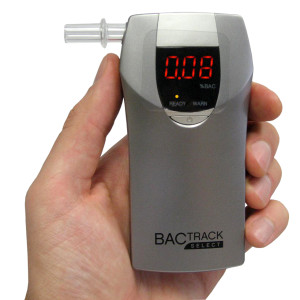Bloom Legal Network DWI Guide: Breath Test Accuracy

Photo courtesy of breathalyzer.net
If a police officer suspects that a driver is under the influence of alcohol or drugs, the officer will administer various test, starting with a field sobriety test, and then possibly moving on to a blood, or breath test. A breath test is an analysis of breath gas, using a “breathalyzer” (which the police can do immediately, on the road) gives only an indirectly determined value for blood alcohol level (BAC). It’s based on how much alcohol is in some portion of exhaled air, not how much alcohol is in the blood.
As we have discussed on Bloomlegal.com, Louisiana has an implied consent law, wherein anyone arrested of a DUI must submit to a breathalyzer test or face an automatic one year suspension of their license. The result of this breath test will have an affect on your criminal sentence and also the length of your driver’s license suspension.
However, over the last few years breath tests have been under much scrutiny. Evidence exists that the breathalyzer tests are not 100% accurate. Accordingly, some states have begun to reject the breathalyzer as evidence in DUI cases. Courts in Ohio and Pennsylvania have recently refused the admission of the breathalyzer in DUI cases.
The State University of New York’s sociology department points out that a breath test is not based on science. A breath test looks for the presence of ethyl alcohol, which is found in beer and wine, but other substances contain a similar molecular structure. This means that the results of a breath test can be influenced by things such as: dirt, moisture, cell phones and police radios, body temperature of the person being tested, breads and blood in the mouth.
Alcohol-containing substances in the mouth can also produce falsely high readings, since the amount of alcohol vapor they give off is much greater than any amount exhaled from the lungs. This includes stomach fluid vomited or regurgitated up within 20 minutes of taking the test, some toothache medicines, mouthwashes, and breath fresheners. Even a burp just before or while blowing into the breathalyzer may cause a falsely high reading.
Studies have even shown that exercise and contact with certain chemicals can create a false reading on a breathalyzer. In one experiment, a man’s BAC was tested after he had worked with contact cement and oil-base paint. The test was performed 20 minutes after he finished the project and showed his BAC at 0.12, even though he had not touched a drop of alcohol.
When people are facing a charge of DUI, it is important for them to meet with an experienced attorney who can discuss defense strategies with them. Every case is different and we cannot predict the outcome of your individual case. It is important to consult a lawyer regarding the facts of your case. Never drink and drive. If you are planning on drinking, always use a designated driver. If you are intoxicated and you do get arrested, please don’t hesitate to call Seth Bloom at Bloom Legal Network for a consultation. There is nothing easy about dealing with a DWI charge. Let Seth help you through this tough and complicated time.
Read: http://www.digitaljournal.com/pr/1670465#ixzz2qgRfV5AM






